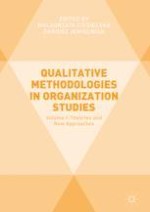2018 | OriginalPaper | Buchkapitel
8. Interpretation, Reflexivity and Imagination in Qualitative Research
verfasst von : Yiannis Gabriel
Erschienen in: Qualitative Methodologies in Organization Studies
Aktivieren Sie unsere intelligente Suche, um passende Fachinhalte oder Patente zu finden.
Wählen Sie Textabschnitte aus um mit Künstlicher Intelligenz passenden Patente zu finden. powered by
Markieren Sie Textabschnitte, um KI-gestützt weitere passende Inhalte zu finden. powered by
